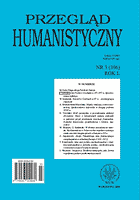STRONNICTWO KRÓLEWSKIE A SPRAWA HUSYTYZMU PO ŚMIERCI WŁADYSŁAWA JAGIEŁŁY
THE ROYAL PARTY AND THE ISSUE OF HUSSITISM AFTER WLADYSLAW JAGIELLO’S DEATH
Author(s): Aldona SkałaSubject(s): Cultural Essay, Political Essay, Societal Essay
Published by: Wydawnictwa Uniwersytetu Warszawskiego
Keywords: jagiello; jagiełło; hussitism; husytyzm
Summary/Abstract: The Luxemburg-Jagiellonian competition in 15th-century Europe was conducted on many levels. Hussitism, due to Czech neighborhood, made Luxemburg possibility more popular in the court and among clergy. Jagiello’s politics towards Hussitism was vague and inconsistent. On the other hand, Jagiello married a Russian orthodox princess. This marriage might have been Witold’s attempt to prevent a Luxemburg-Jagiello treaty. After Jagiello’s death, the young queen was still influenced by Hussitism and carried out a moderate pro-Czech politics. She accepted the Hussitian offer of the Czech throne for her son Kazimierz in 1437, persuading the idea to the Polish nobility. Although the idea failed, she manifested her independence from the bishop of Cracow. The later confederation of Spytek of Melsztyn seems to have been supported by her. Later conflicts with the bishop shifted her closer to the Royal Party. After she had resigned from the throne, she moved to Sanok, the area where Hussitism flourished.To sum up, it has to be highlighted that the Royal Party and the queen’s attitude to Hussitism was not based on religious beliefs but was an outcome of consequent politics of Jagiello dynasty.
Journal: Przegląd Humanistyczny
- Issue Year: 417/2008
- Issue No: 02
- Page Range: 63-70
- Page Count: 8
- Language: Polish
- Content File-PDF

